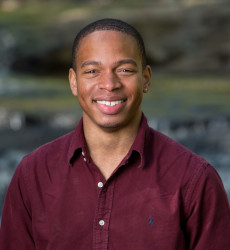Denzell Cross is a PhD candidate in Ecology and Integrative Conservation (ICON). His dissertation research investigates the historical and long-term impacts of urban development on stream and river ecosystems, as well as the role of sociohistorical processes in shaping contemporary ecological conditions and human perceptions of stream and rivers in the Atlanta metropolitan area.
Before starting school at UGA, Denzell worked as a research technician at the Joseph W. Jones Ecological Research Center (JERC), where he helped contribute to research investigating the impacts of intermittent stream flows on aquatic biota due to agricultural practices. Observing the impacts of human-mediated flow regimes in rural Georgia, led to his interest in exploring the ways human practices influence water resources in human dominated landscapes, such as large metropolitan areas.
From an ecological perspective, Denzell’s research will explore the trait and taxonomic variation of aquatic insect communities impacted by urban development dating back from 1975. He has collected data in 17 historically sampled stream sites across the greater Atlanta metropolitan area and plans to compare his findings to identical studies conducted in the same stream reaches in 1975 and 2003. Very few studies have examined how historical, long-term pressures of urbanization shape communities through time. By integrating historical community datasets with ecological sampling methods, Denzell’s research will help further our understanding of how ecosystem structure and function may change across large temporal scales in urbanized regions. Additionally, his work will provide a more holistic understanding of how urbanization influences the biological characteristics of streams, which can further aid in the management and conservation of aquatic ecosystems in urban environments.

Building on the historical component highlighted in his ecological research, Denzell also plans to examine the role of sociohistorical processes related to spatial placement of environmental hazards in the city of Atlanta. For example, in urban environments, combined sewer overflow’s (CSO’s) are a form of wastewater infrastructure in which rainwater, and domestic and industrial sewage are collected in the same pipe. During heavy rain events, and combined with pervasive impervious surface cover, these systems tend to become overtaxed and can result in the backflow of untreated sewage throughout city streets and waterways, leading to significant ecological and environmental health issues. Such systems are not uncommon in low-income, communities of color, and can trace their origins to historical policies and practices designed to oppress brown and black communities. Using an urban political ecology framework, Denzell’s research aims to understand how legacies of racial and ethnic segregation throughout the Atlanta metropolitan area have exacerbated issues of environmental inequality and have adversely impacted relationships between communities of color and waterways.

A portion of Denzell’s research will involve looking at the historical development and contemporary residential perceptions of streams and rivers, such as those in the Proctor Creek Watershed, so as to understand the variety of ways in which race and nature intersect both historically, and in contemporary times. Through this work, Denzell aims to promote the application of more equity-minded approaches towards the renewal and restoration of natural resources in urban areas, as effective community revitalization requires addressing the impacts of long-term developmental practices so as to better understand how social and environmental inequalities generate unjust urban landscapes.
Denzell began his PhD in August 2017. Throughout his time at UGA he has been involved in many organizations such as EcoReach, a student-led environmental education organization part of the Odum School, and also the Odum School’s Graduate Student Organization (GSO), where he served as a student representative of the Diversity committee in 2018. He was a recipient of a Predoctoral Fellowship from the Ford Foundation in 2018. Denzell has also been a heavily involved student member of the Society of Freshwater Scientists (SFS), having served as a reviewer for the Instars program, a recent recipient of a Emerge Fellowship and a Student Endowment award, and serves as a co-chair on the Minority Serving Institutions committee as part of the Justice, Equity, Diversity, and Inclusion (J.E.D.I) Task Force of the SFS.

